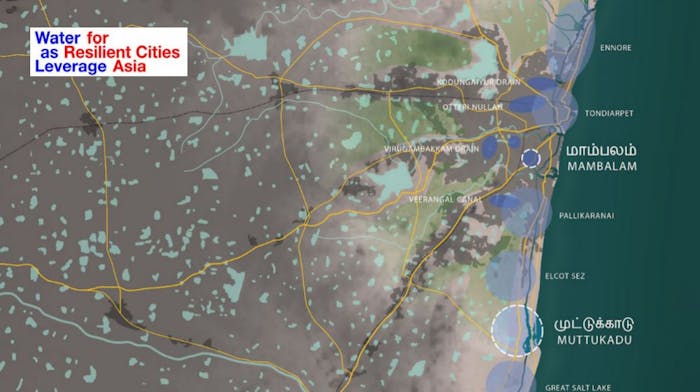The proposal for Neithal Muttukadu aims to restore economic opportunities by revitalizing green and blue infrastructure.
The project introduces water harvesting measures in order to create a circular local water cycle over an extensive area from the degraded inland forests to the perimeter of the business area (SIPCOT, a Specialized Economic Zone). This revitalized waterscape then acts as a catalyst to clean up the canal, re-naturalize its banks, restore backwater sloughs, and ultimately create a new vital ecology based on ecotourism that links the basin back to the forest on higher ground. Nature-based sand nourishments protect the coast near the mouth of the basin and therefore also the businesses, residents and ecologies in proximity.
The overarching goals of this project are to develop an adaptive coastal defense plan, improve water quality of the Muttukadu Backwaters, and redesign the connections from the IT corridor in the west, across Buckingham Canal into Muttukadu and Kovalam villages by the coast. Specific strategies are:
1. Adaptive coastal defenses based on sand nourishment along Muttukadu beach, dredging of the sea outlet between Muttukadu and Kovalam beaches, installation of flap gates and pumps along Buckingham Canal, and – over the long-term – additional sand suppletion from deeper sea waters.
2. Systems thinking and decentralized actions for water quality improvement, via redirecting point sources of wastewater, implementing a distributed wastewater drainage system, and restoring the Muttukadu wetland by removing contaminated sediments and deepening the lagoon, among other strategies.
3. Functionally defining coastal zones to enable the integration of existing activities and new eco-tourism developments while contributing to a safe and biodiverse environment.
4. Transverse canals that link Old Mahabalipuram Road and the East Coast Road to the lagoon, facilitating the creation of a new island and transit-oriented urban development.
5. Habitat islands within the lagoon that can restore habitats and act as a natural mechanism to keep up with the rising sea levels (mudflats and wetlands rise over time due to organic matter accretion).
6. Collaboration through involving the community in the development of specific interventions along with private companies and government agencies.
![]() IIT Madras, Care Earth Trust, Karlsruhe Institute for Technology, Waggonner & Ball, Benthem Crouwel Architects, Arcadis, VanderSat
IIT Madras, Care Earth Trust, Karlsruhe Institute for Technology, Waggonner & Ball, Benthem Crouwel Architects, Arcadis, VanderSat

 06 Clean Water and Sanitation
06 Clean Water and Sanitation
 11 Sustainable Cities and Communities
11 Sustainable Cities and Communities
 03 Good Health and Well-being
03 Good Health and Well-being